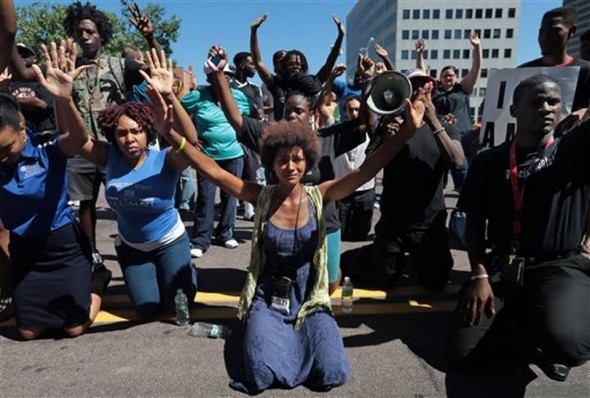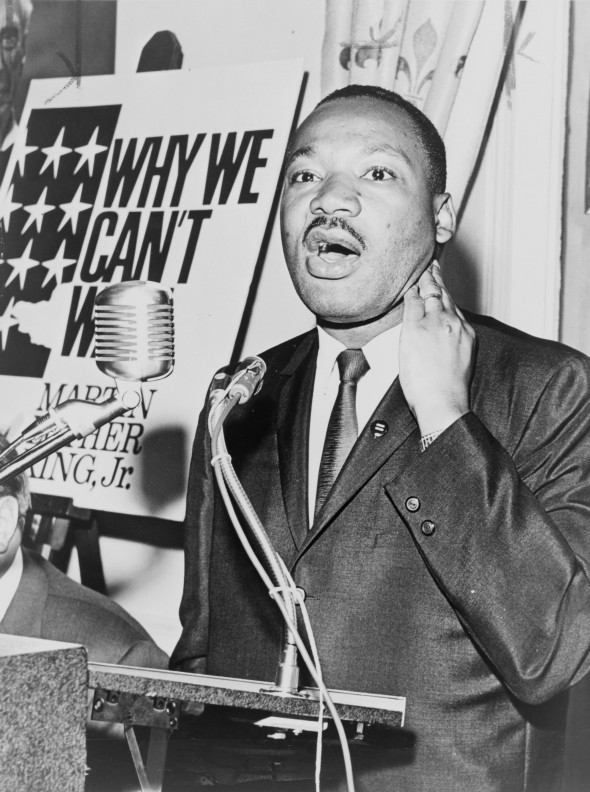
Written by Alexis Macklin, Sholpan Zhaksybaeva and Krista Kull
Edited by Alexis Macklin
On Aug. 9, 2014, Ferguson police officer Darren Wilson shot 18-year-old Michael Brown. The death of the young black man in the small Missouri town sparked a racial controversy across the United States. Whether or not Darren was righteous in his actions, the country could not stop debating race.
READ MORE ON THE CASE HERE:
http://www.pbs.org/newshour/updates/newly-released-witness-testimony-tell-us-michael-brown-shooting/
http://www.npr.org/blogs/thetwo-way/2014/11/24/364103735/ferguson-timeline-grief-anger-and-tension
American media focused on this controversy, even the simple news coverage of the Michael Brown case could not escape words like “black”, “white”, “racism” and “inequality”. The case sparked protests and riots around the country and the anger did not cease over time. Pres. Obama addressed the racial tensions in his 2015 State of the Union address.
“We may have different takes on the events of Ferguson and New York. But surely we can understand a father who fears his son can’t walk home without being harassed,” Obama said, as quoted in the National Journal. “Surely, we can understand the wife who won’t rest until the police officer she married walks through the front door at the end of his shift.”
The social unrest sparked research from news outlets into studies about racial tensions between civilians and the police force. Slate.com reported that young black males were 21 times more likely to be shot by police officers than young white males.
Americans looked to both the past and future for answers to solve the racism. Many opinion articles from a span of news outlets discussed the comparison between Ferguson and the Civil Rights Era and what Ferguson meant for the future of America.
While Americans worried about the social unrest the Ferguson case would bring, other communities across the globe were not interested.
News about Ferguson case was not on the top of interest of Kazakhstan or Estonian society. Racial issues are not a reality for Kazakhstan where tensions may exist only in interethnic and international relationships. One may take into account that in Kazakhstan there are more than 120 nationalities living, and during Soviet period a lot of ideological efforts were made to build some kind of peace between nations under the slogan “Equal rights for all nations”.
Although today there are conflicts between nations after the collapse of the Soviet Union (Kazakh-Russian; Kazakh-Uigur; Chechen- Kazakh), the culture and ideology that were developed during the Soviet regime still helps to keep the situation under control.
There is one case of Kazakhstan news coverage: https://www.youtube.com/watch?v=LE33F0gGFtE#t=13
Estonia echoed Kazakhstan’s response to the Ferguson case by only publishing minimal coverage that was republished by American news outlets. There were no public debates or protests, just minimal coverage so the community was aware.
The Ferguson case has become a rallying cry in the United States, but this social unrest of racism may not be important to the global community. America is the melting pot of many different races and ethnicities so miscommunication between cultures and discrimination is common. Racism in the United States is an on-going battle for different groups of minorities and no single solution can completely demolish centuries of racism.


It is interesting to me that there are so many cultures and ethnicities in both the U.S. and Kazakhstan, yet racial divide is so paramount in the U.S. but insignificant in Kazakhstan. Our current societies are still reflective of their histories, be it long-standing racial tension in the U.S. or national slogans from the reign of the Soviet Union. The kind of racial polarization we see in relation to Ferguson is one of the pitfalls of a free, democratic country. The public has been so critical of U.S. leadership during this time, but we must remember that our country is built on freedom without one person having the ability or power to put an end to the debate. That’s not to say that we’re not in need of a social leader, like Martin Luther King Jr., during this modern age of intense racial division.
When it comes to global coverage, media outlets cover what resonates with their country’s history and beliefs. I think this is a large reason why many foreign media outlets did not cover Ferguson in depth or at all. When it comes down to it, journalism is a business, and business is money. If a story won’t sell, it usually isn’t published. Also, countries usually have controversial stories happening locally that take precedence over the ones abroad. If it’s not close in proximity or of any future importance, the media will probably move on to issues closer to home.
Great work. Just one house-keeping comment. You reference a YouTube clip and I was wondering why did you not instead just embed the video into the post? Otherwise, illuminating insights.
It’s no surprise to me that proximity played a part in determining the newsworthiness of an issue occurring thousands of miles away from other publications. Considering impact and proximity are two key components to an event being deemed newsworthy, neither of which were a factor of the Ferguson case in Estonia or Kazakhstan, it puts our issues into perspective. Something can be such a fuss and have real impact and meaning at home, but we are just one people in a globe of other nations focusing on their own “social injustices” or “inequalities” that make ours just a little bit smaller. However, when seeing other nationals also have these “social injustices” and “inequality” issues to work out, it, on the other hand, makes the world a bit smaller.